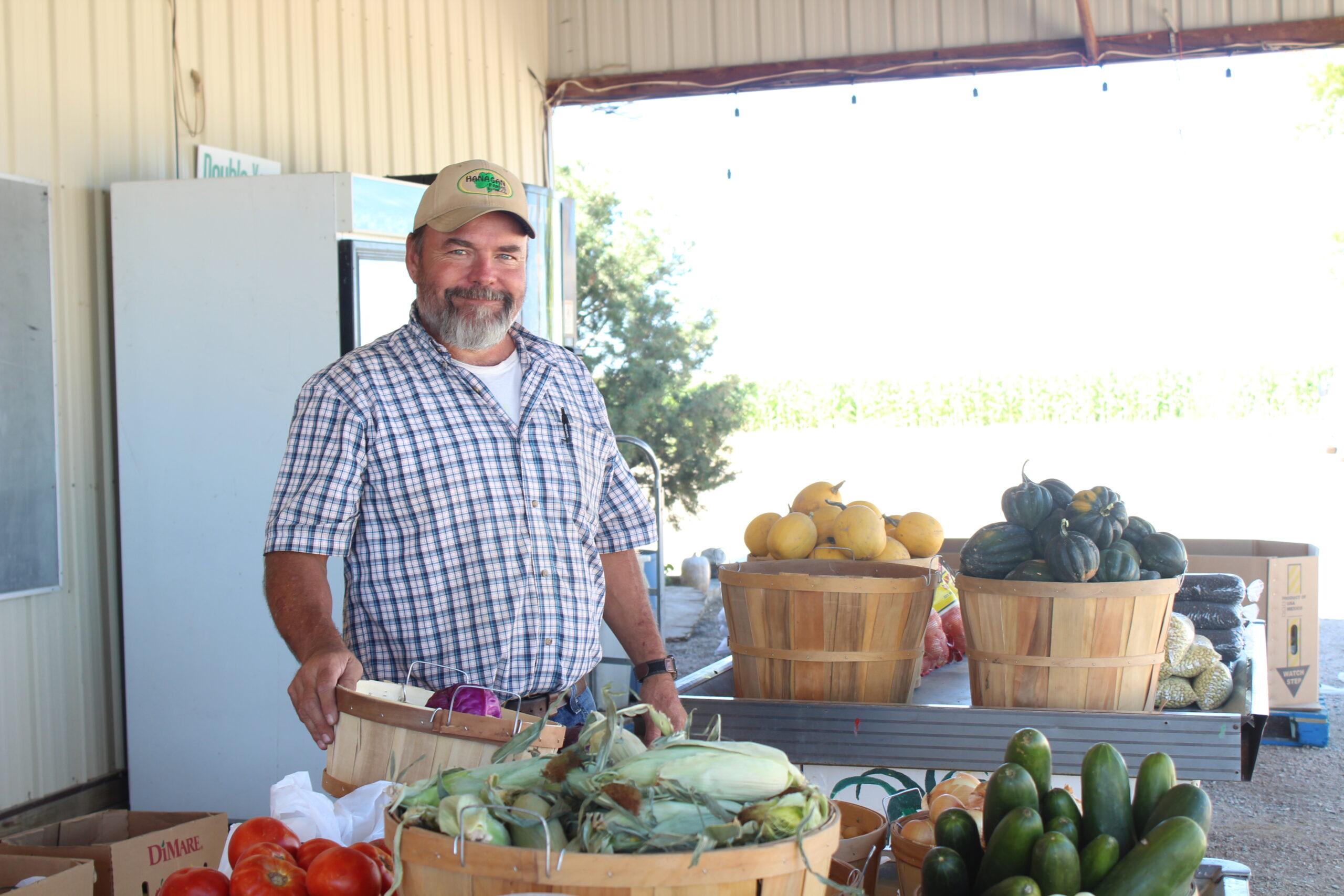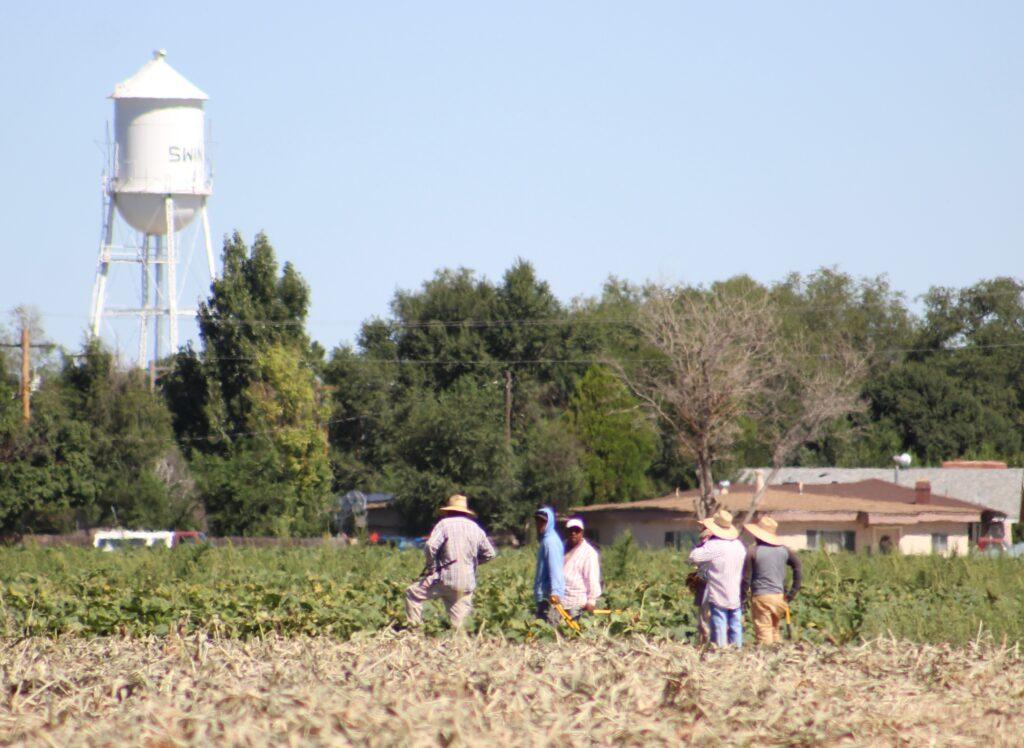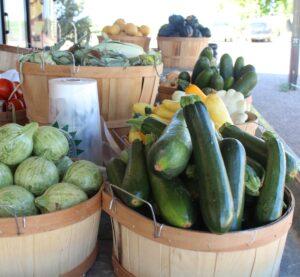
Just a ways off Highway 50 in the town of Swink in southeast Colorado, a table full of freshly harvested fruits and vegetables sits in front of a massive metal shed. A whiteboard on the wall nearby lists prices for pick-your-own tomatoes.
Eric Hanagan passes in and out of the door, directing workers and chatting with customers as they pick through baskets of cucumbers, melons, squash, tomatoes, and chiles.

As a fourth-generation farmer, Hanagan and his brother now operate the nearly 1,000 acre farm on land their family has tilled soil, tended to crops, and made a life from for more than a century. He says it's the only thing he knows. The growing season is short and hard. Weather is always a risk.
He's quick to share that he hopes his kids don't follow in his footsteps.
"I think you'll find a general consensus among all the produce growers in the Arkansas Valley that we want our kids to have a better life," he said. "And it's just too hard and it's not fun anymore."
Two years ago, Colorado passed the Agricultural Workers' Rights Bill. The expansive and controversial bill mandates rest and meal breaks for field workers and allows for unionization and collective bargaining. Workers must make at least $13.25 an hour, the state's current minimum wage. Those on certain visas – including those who work on Hanagan's Farm – get over three dollars more. Hanagan has no problems with a lot of that and already followed many of the new rules.
"My guys...if they were a little thirsty, they could go get the water. If they need to go to the bathroom, they could go to the bathroom. I didn't keep a thumb on 'em," he said. "But now with all these regulations and everything, I'm going to have to hire a guy and micromanage their minutes, and so it just makes 'em tougher on them."
That new hire will likely come next year and is just one example of how Hanagan's been spending this season figuring out what he needs to change and when he needs to do it.
In seasons past, he hired 15 workers every April from Guanajuato, Mexico on federal worker visas. He said he pays about $1000 per person for paperwork and travel and they make $16.85 an hour. He also provides housing, and records from the state Department of Labor show Hanagan Farms has passed all inspections meant to ensure workers have adequate housing.

Hanagan said for him, it's not just about checking a box.
"I'm a godparent to several of their kids. I've been to quinceañeras. We have barbecues together and we treat our employees as family," he said.
The crew stays and works almost daily through mid-October. Hanagan said the money helps provide them with a safety net.
"They want as many hours as possible so that they have a nest egg to provide for their family all winter long because they're in an economically depressed area down there," Hanagan said.
It's even more money with the new overtime rules, and that's precisely the point for farmworker advocates like Hunter Knapp with Project Protect Food Systems Workers.
The nonprofit was created in 2020 to ensure adequate protection of farm workers during the COVID-19 pandemic. Their work has since shifted to directly supporting farm workers and rural Spanish-speaking communities. Knapp's group supports the state bill but also sued Gov. Jared Polis and the state’s labor department earlier this year, arguing the way overtime requirements were laid out favors farmers rather than the workers the law was meant to protect.
Eric Hanagan, Hanagan Farms
"The goal of the overtime wages and overtime rule, in general, is to compensate workers for those extra sacrifices they're making when they're working 60, 70, even 80 hours a week to bring the harvest in during those critical periods," Knapp said.
The lawsuit is still pending.
Advocates, including Knapp, argue the legislation is an effort to re-include farm workers after they were exempted from protections in the Fair Labor Standards Act, meaning they have no right to overtime pay under federal law. Colorado is now one of four states where agricultural workers are covered by a state-level overtime law.
"And so where previously the workers have borne that entire extra cost on their bodies and the time spent with their families, we're hoping that overtime pay can help compensate them in a more traditional way like the rest of the workers in the United States," he said, referring to the new overtime pay requirement.
But Marilyn Bay Drake with the Colorado Fruit and Vegetable Growers Association says the new law has farmers across the state cutting back on acres and switching to crops they can harvest with a machine to minimize costs. The organization lobbied against the bill before and after it passed. She says some farmers are considering shutting down entirely.

"It's like we're in the pond drowning right now, and we need the lifeline now or we can't reach it financially," she said.
All but one of the workers at Hanagan's farm declined an interview. 18-year-old Jimmy Peña calls the Hanagans amazing people and said this job is a way to earn money for college. He plans to come back each season, just like his grandfather who worked here before him.
"My grandpa worked here for half of his life and almost 50 years," Peña said. "And so we've really known Hanagan Farms for half of our lifetime."
Hanagan said he's never had an issue meeting the needs of his crew.
"As a farmer, we take care of our fields, and we take care of our workers," he said. "We know how to do that. We don't need to be told a certain way to do it that isn't going to work for us."

Hanagan is one of a handful of family-owned farms that still grow Rocky Ford melons in Otero County, according to the local growers association. He said raising prices is just about his only option. And he doesn't think customers will be willing to pay the difference.
Advocates, like Knapp, disagree.
"I hope that the lovers of Rocky Ford melons and Palisade peaches will be willing to pay that extra 15 or 25 cents because they know that the workers in Colorado are protected by strong labor laws and that the employers in Colorado are doing the best that they can," he said.
The alternative, he said, is a potentially cheaper product shipped in from another country or state with worse labor protections.








